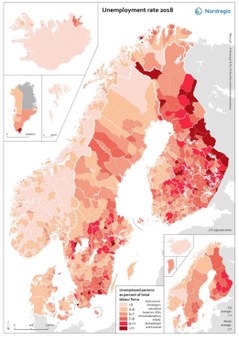Labour Market
Faroe Islands: Old recipes and new crises
An economic crisis from 1992, a salmon test from 2000 and an idea for a restaurant from 2013. These are some of the ingredients in the Faroese recipe for how the island society in the North Atlantic and its 52,000 inhabitants would come out out of the Corona crisis better than anyone. So far it has been a rather good recipe.
Iceland reopens tourism – carefully
Iceland is beginning to open up for tourism after the severe effects of Covid-19 this spring. The virus meant most of the tourism industry had no customers and many companies had to close down. Today, most have reopened and try to attract domestic travellers while waiting for foreign tourists to return to Iceland.
Schleswig-Holstein – from conflict to peaceful border commute
Some 15,000 people commute to jobs across the border between Denmark and Germany, which is 100 years old this year. That makes the border region one joint labour market, yet one with widely differing legislation and workplace cultures on either side.
The Nordics must pull together to emerge from the epidemic
The Nordic countries will take historically huge steps to limit the economic and social consequences of the Corona epidemic. The governments sometimes chose different measures to fight contamination, with different economic consequences. To get out of the crisis, greater cooperation is needed.
Iceland’s unemployment soars fivefold
In just four weeks, unemployment in Iceland rose fivefold. At the end of February, 10,000 people had no jobs. By the end of March, the number was 50,000. This has never happened before, says Unnur Sverrisdóttir, head of Iceland’s Directorate of Labour VMST.
Labour shortage for Nordic agriculture and forestry
As unemployment rises rapidly, many Nordic farmers worry how they will get hold of foreign seasonal workers. The hardest hit are gardens, strawberry farms and other agriculture.
Interim Norwegian study of the corona epidemic’s effect on workers
Many Norwegian workers have become pessimistic about the future since the corona epidemic broke out. Those with the lowest levels of education and lowest pay have been the hardest hit. People between 30 and 44 are exposed shows a study from the Norwegian Work Research Institute WRI.
A Nordic state of emergency
The corona epidemic has closed borders in the Nordic region and the rest of the world. In most countries governments have increased their powers and citizenship has become more important, while personal freedom has been restrained.
National decisions have major consequences for border regions
Activate the networks, develop the dialogues, identify the updates. These are necessary and urgent tasks for the Nordic border region information services, thrown up by the corona crisis. Öresunddirekt in Malmö remains closed to visitors. Behind doors, there is plenty of action.
The Öresund cooperation was set to expand – then corona hit
Billions of kroner. That is the estimated annual benefit for Denmark and Sweden resulting from a fully integrated labour market across Öresund. Nine focus areas have been identified and presented, ready for action as soon as the corona crisis ends.
Corona crisis drives up Nordic unemployment
Unemployment has risen dramatically across the Nordics since the emergence of the coronavirus. The countries have chosen different ways of handling the situation, however, based on different labour market models, measures imposed and the shape of the labour market.
Record low unemployment in the Faroe Islands – just 296 people
Nowhere in the Nordics will you find a higher employment rate than in the Faroe Islands right now. It stands at 90%, and unemployment is only 0.9%. What is it like in a society where nearly everyone has a job, and where being unemployed is correspondingly difficult?
Nordic visions of more children and fewer suicides
The Nordic cooperation's symbol is a swan. But black swans also symbolise the unexpected. This newsletter is about both birth and death. Assistant nurses play an important role in what happens between those two events.
Less part-time work to secure more “warm hands”
A major and urgent lack of trained social and health care assistants – so-called SOSUs – has led to a heated debate over the widespread use of part-time jobs in Denmark’s social and health care sector.
Swedish assistant nurses want higher status through legal recognition
Assistant nurse is one of the most common professions in Sweden. 180 000 out of a total of 200 000 workers in elderly care are assistant nurses, but unlike their other Nordic colleagues, their profession is not regulated. Making this happen has long been a trade union demand and right now legislation is being prepared which might give them a protected title.
Torbjørn Røe Isaksen takes on tricky government post
Torbjørn Røe Isaksen became Norway’s new Minister of Labour and Social Inclusion on 24 January. It is the least sought-after government post right now, after the biggest legal scandal in the country’s history. But Isaksen has ambitions.
Tuula Haatainen new Finnish Minister of Employment
Experienced Haatainen (59) joins a government which features numerous young female minister. So what experience do Finnish politicians have from real working life? The question arose with Finland’s sudden change of government in mid-December.
New agreement for education on the Cap of the North
The Arctic Vocational Foundation has secured funding from Sweden, Finland and Norway for a further four years of vocational training for youths. A total of 285 youths will be trained every year.
Greenland needs new jobs and foreign labour
There is an urgent need to create new jobs in Greenland’s mining and tourism industries. At the same time more foreign labour is needed, say the social partners.
Eva Nordmark's task: to liberalise Sweden’s employment act and reform the employment service
When former TCO President Eva Nordmark accepted to replace Ylva Johansson as Sweden’s Minister for Employment, she also accepted to follow up on proposals she had been critical of in the past, like the liberalisation of the employment act.
Document Actions



 Follow us on Facebook
Follow us on Facebook
